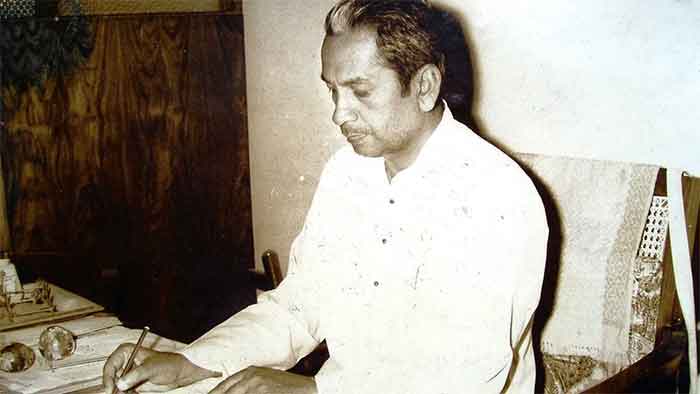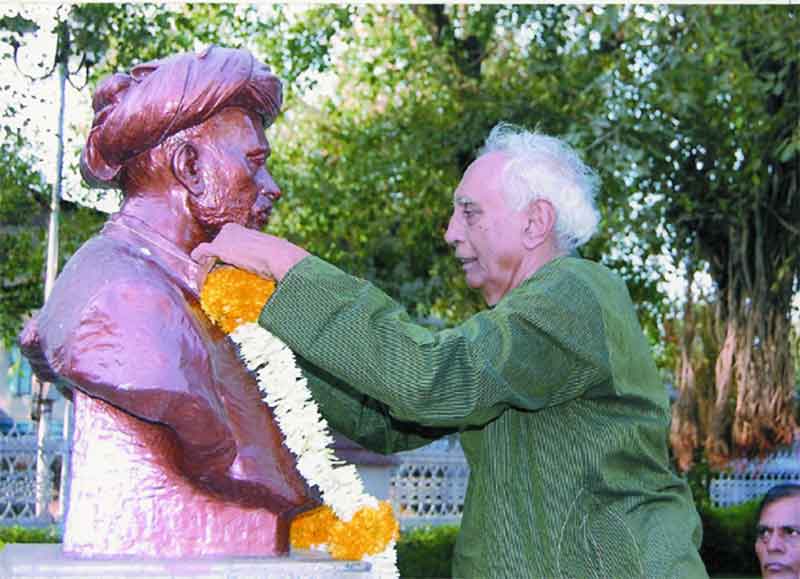
Maharashtra’s progressive record has taken a beating in the last few years. But occasionally there are signs of hope. One of the best reprsentatives of the progressive tradition was Narhar Kurundkar. He was a real public intellectual, atheist, rationalist, outspoken critic whoquestioned almost ridiculed false,established notions. The orthodox told him he would go to hell but they could do not defeat his arguments as he knew Indian philosophy and culture inside out.
Luckily we now have a theatrical performance on his life, the first in Mumbai was held in the P.L. Deshpnde sabhagriha in Ravindra Natya Mandir recently.
In the very first scene we are gripped and get a sense of the man. A condescending Western Maharashtra scholar presiding over the young Kurundkar’s lecure in Pune on philosophy refers to his own long period of scholarship and says Kurundkar has come from far off Marathwada.
Kurundkar reminds the chairperson that the so called backward Marathwada is actually the original seat of Marathi literature, that being older does not mean being more scholarly, he questions the work of the chairman as well as elements in the philosophy of Shankaracharya. Some stories from the scriptures, he points, out actually show that you have to be crafty to win. Not a good lesson in morality. He points to the victory of gods against the Asuras in Samudra Manthan, the churning of the seas.
It is sad that we lost Kurundkar 40 years ago to a heart attack at a young age of 50 . He grew up in Marathwada and had his early education in Hyderabad living in the house of his maternal uncle Nandapurkar, lawyer and scholar. The house gave shelter to numerous other students.
Narayan Surve, the radical poet, used to talk to me fondly of Kurundkar. I knew of Kurundkar through his work, his cousin Indu Deo and others. Kurundkar’s numerous books reprinted by Deshmukh publishers were on display at the well attended performance. There is a demand for shows from many towns for them.
The dramatic presentation was staged by Narhar Kurundkar Pratishthan of Nanded. Was pleasantly surprised to find that the script and conceptualisation is by Ajay Ambekar. Did not know of this part of him when I knew him when he was director of information of Maharashtra government.
The actors sit in four chairs on the stage, taking their turns. Dilip Padhye does well as Kurundkar dressed in dhoti with a Gandhi cap, and Ganesh Pandey plays an almost equally important part of the sootradhar, the chous.
It ends on a correct note with the assertion that a public intellectual in search of truth must learn to be alone, not play to the gallery.
There are elements in Kurundkar’s writings which the Hindu right may exploit. Towards he end of his life he departed bit from his philosophy so as not to hurt the feelings of his relatives. But the overall legacy of Kurundkar is very inspiring and he is the man we need in the current era of irrationality, its deliberate promotion.
We have a new play by Satish Alekar after a long time.The protagonist is a simple ,lonely, old man who does not take any position on politics, neither Left nor Right, but through his life Alekar makes a very subtle commentary on politics, particularly post 2014.
Alekar read the play, it was the first reading , before a knowledgeable theatre audience after the release of a collection of his plays by Bhalchandra Nemade, Jnanpith award winner on September 25.. at Ravindra Natya Mandir in Mumbai.
I have seen Alekar’s work since his first play Micky ani Memsaheb presented in the state government drama competition in Ravindra Natya Mandir in 1973. He is also a very good director, actor and reader of his plays. It is a measure of the technological change since those days that he read the play from his laptop. Alekar is a full theatre person, knows it from all angles and has taught theatre, so the reading was engrossing, effective.
His strength as also of Tendulkar and Karnad is in having a solid understanding of Indian tradition, culture and literature , various nuances mixed with a very modern sensibility.
The play was written during the Covid pandemic and it begins with reflection on Ram Ganesh Gadkari, the renowned playwright who survived the Spanish flu in Pune in 1918. , Gadkari did remarkable work in his short life, could spend some time fishing in the river in Pune in those less hurried days The protagonist , now approaching 80, living all alone, recalls life since then. The play makes a deep impact , it does not have plot as such, it is very subtle with numerous literary, cultural, political references from ancient times. After his initial monologue, enters his assistant Thaki, simple but very devoted woman who nurses him till his sad death at home due to Covid. The Covid part is very moving, the simple, old man, does one heroic act, he refuses to take oxygen and wants it to be used for a younger person.
Alekar makes an allegorical use of the Kargota, a silk thread, traditionally worn in different parts of India around the waist and in different ways in other cultures. It is perhaps symbol of common thread that has bound us over generations but that whole way of life is now threatened by the events after 2014. Gadkari passes on the thread to Diwakar the playwright, his contemporary and friend, who in turn passes it on to D.B Mokashi, acclaimed writer, he gives it to Vijay Tendulkar, who admired him greatly.
Alekar was ably helped in the presentation with music and screen effects by Pravin Bhole, director of Lalit Kala Kendra, the university theatre department of Phule university in Pune.
This year also marks fifty years of the acclaimed play Ghashiram Kotwal directed by Jabbar Patel who was present on the occasion. Interestingly, the idea for the play was suggested to Tendulkar by Bhalchndra Nemade.
Many theatre stalwarts of Pune , like them, owe their career building to the prestigious Purshottam Karandak cup drama competition begun way back in 1963 in memory of Purshottam Vaze.
Interestingly a controversy is currently on in theatre circles because last week, the judges for the recent Purshottam cup contest, including Paressh Mokashi, declared that they did not find any play in the contest worthy of the first prize.
Ramdas Bhatkal, 86 year old veteran of Popular Prakashan , publishers of several prominent playwrights , said theatre books do not sell so well. Even Ghashiram Kotwal took more than a decade to go into the second edition. Bhatkal has played a leading role in the theatre and literary life of the state . He is more than a publisher, he has a very keen understanding of culture and is cultural figure in his own right. Popular completes a century in two years.
The 50th anniversary of the performance of Ghashiram Kotwal , the celebrated play by Vijay Tendulkar this year, is of considerable significance. Consideriang the current conservative climate in Maharashtra it is interesting that fifty years ago we had such a rebellious play. It was against Brahminism, not Brahmins. Most of the actors in the large cast in this brilliantly choreographed production, were Brahmins. Mohan Agashe, who played the main role of Nana Phadanavis, and Satish Alekar, who was the assistant director, are very much active today as is director Jabbar Patel.
Unfortunately, some politicians in their enthusiasm to oppose the BJP type of cultural influence are doing it in a thoroughly wrong way. Chhagan Bhujbal, former deputy chief minister and a strong voice in the pro-OBC movement, has landed in controversy by criticising the display of potraits of goddess Saraswati in schools and said these should be replaced by Savitribai Phule, the pioneer in women’s education.
It must be remembered that Saraswati is a cultural symbol, not a religious one. Numerous schools in the country are named Saraswati as she is the goddess of knowledge.
The BJP supporters have counter attacked him saying Savitribai herself in her writing has hailed the importance of Saraswati for education.
Today is the 90th birth anniversary of Hamid Dalwai, a social reformer who organised the first morcha of Muslim women in Maharashtra, campaigned ceaselessly against the orthodoxy but strangely he is neglected today by what would go about as the secular Muslim intelligentsia. The memory was revived today by circulating of an obituary written on him by the highly talented novelist Bhau Padhye. Padhye recalls the days when Dalwai would put writing of Dostoevsky before him and asked him to read it. Dalwai died in 1977 at the early age of 45, a loss to the progressive movement.
(Vidyadhar Date is a senior journalist and author of a book on democratisation of transport)
















































